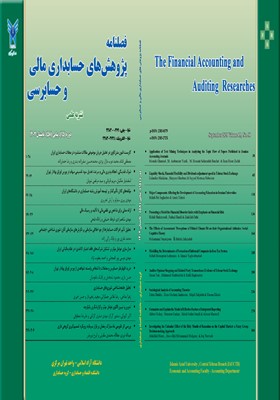کاربست فنون متنکاوی در تحلیل جریان موضوعی مقالات منتشره در مجلات حسابداری ایران
محورهای موضوعی : حسابداری مالی و حسابرسی
مصطفی قناد
1
![]() ,
محمد عرب مازار یزدی
2
*
,
محمدحسین صفرزاده بندری
3
,
محمد عرب مازار یزدی
2
*
,
محمدحسین صفرزاده بندری
3
![]() ,
رضا حصارزاده
4
,
رضا حصارزاده
4
1 - گروه حسابداری، دانشکده مدیریت و حسابداری، دانشگاه شهید بهشتی، تهران، ایران.
2 - گروه حسابداری، دانشکده مدیریت و حسابداری، دانشگاه شهید بهشتی، تهران، ایران.
3 - گروه حسابداری دانشکده مدیریت و حسابداری دانشگاه شهید بهشتی تهران
4 - گروه حسابداری، دانشکده علوم اداری و اقتصادی، دانشگاه فردوسی مشهد، مشهد، ایران
کلید واژه: متن کاوی, مجلات حسابداری, سیاست گذاری علم, گرایشهای پژوهشی, واژههای کلیدی: پژوهش حسابداری,
چکیده مقاله :
چکیدههدف: توسعه تحصیلات تکمیلی و رشد قابلملاحظه انتشار مقالات در تمام حوزههای دانش و بویژه در رشته حسابداری، لزوم توجه به بررسی وضعیت کنونی نشر مقالات علمی را بیش از پیش نمایان میسازد. مطالعه روند پژوهشهای انجام شده از طریق تجزیه و تحلیل موضوعی مقالات منتشرشده در مجلات تخصصی داخلی که مصداقی از نقشه علمی رشته مزبور است، برای سازمانها، پژوهشگران و سیاستگذاران علمی اهمیت ویژهای دارد. بنابراین پژوهش حاضر با هدف تجزیه و تحلیل مقالات منتشرشده در مجلات مصوب وزارت علوم، تحقیقات و فناوری در رشته حسابداری از اولین شماره چاپ شده پس از اخذ رتبه علمی تا پایان سال 1399 با استفاده از فنون متن کاوی طرحریزی شده است.روش: از 4924 مقاله انتشاریافته طی سه دهه در 20 مجلۀ حسابداری، تعداد 4201 مقاله که چکیده انگلیسی آنها در تارنمای مجلات و پایگاههای اطلاعاتی موجود بود به عنوان نمونه انتخاب و جهت طبقهبندی موضوعی مورد استفاده قرار گرفته است. بهمنظور شناسایی مهمترین واژگان بکاررفته در مقالات از الگوریتم وزندهی TF-IDF، برای تعیین موضوعات از الگوریتم مدلسازی موضوعی LDA و جهت کاربست الگوریتمهای متنکاوی از زبان برنامهنویسی پایتون استفاده شده است.یافتهها: یافتههای پژوهش نشان میدهد که حوزههای موضوعی بازار سرمایه (29%)، حسابداری مالی (20%)، راهبری شرکتی (10%)، گزارشگری مالی و مسئولیت اجتماعی (9%)، حسابداری مدیریت (9%)، حسابرسی (8%)، مالی و سرمایهگذاری (7%)، حسابداری بخش عمومی (3%)، آموزش و پژوهش حسابداری (3%)، بانکداری و سیستمهای اطلاعاتی (2%) به ترتیب مهمترین حوزههای پژوهشی در مجلات حسابداری ایران هستند. بررسی روند انتشار مقالات در هریک از حوزههای موضوعی پرطرفدار نشان میدهد، حوزههای موضوعی حسابداری بخش عمومی، حسابرسی، گزاشگری مالی و مسئولیت اجتماعی شرکتها، حسابداری مدیریت، بانکداری و سیستم اطلاعاتی و آموزش و پژوهش حسابداری رو به رشد، حوزههای موضوعی حسابداری مالی، تحقیقات بازار سرمایه و پژوهشهای حوزه مالی و سرمایهگذاری رو به افول و حوزۀ موضوعی راهبری شرکتی دارای ثبات در نشر میباشد. نتیجهگیری: نتایج بیانگر این است که توجه به موضوعاتی نظیر فناوری و سیستمهای اطلاعاتی حسابداری، حسابداری بخش عمومی و آموزش و پژوهش حسابداری در مقایسه با سایر حوزههای پژوهشی کمتر بوده است؛ چراکه تلاشهای چندانی برای نشر مقالات در این خصوص صورت نگرفته است؛ بنابراین توجه صاحبنظران به سیاستگذاری علم و نشر در مجلات ضروری به نظر میرسد
AbstractObjective: The advancement of postgraduate education and the substantial rise in the publication of papers in all fields of knowledge, particularly in the field of accounting, require closer attention to the current publication situation of scholarly papers. Studying the research trend through the topic analysis of papers published in domestic scholarly journals, which is an example of the scientific map of a field, is of outstanding importance for organizations, researchers, and science policymakers. Therefore, the present study is aimed at analyzing the papers published in the journals approved by the Ministry of Science, Research and Technology in the field of accounting from the first issue published after receiving scientific rank until the end of 2020 employing text mining techniques.Methods: Out of 4924 papers published in 20 accounting journals over three decades, 4201 papers whose English abstracts were available on the websites of journals and databases were selected as the sample and used for subject classification.To identify the most important words used in the papers, TF-IDF weighting algorithm was used, and the LDA topic modeling technique was implemented to extract topics. Moreover, the Python programming language was employed to apply text mining algorithms.Results: The research findings indicate that capital market (29%), financial accounting (20%), corporate governance (10%), financial reporting and corporate social responsibility (9%), management accounting (9%), auditing (8%), finance and investment (7%), public sector accounting (3%), accounting education and research (3%), banking and information systems (2%) are respectively the most important research areas in Iranian accounting journals.Reviewing the publication trend of papers in each of the popular research areas suggests that the topics of public sector accounting, auditing, financial reporting and corporate social responsibility, management accounting, banking and information systems, and accounting education and research follow a growing publication trend. In contrast, the topics of financial accounting, capital market, and finance and investment show a downward publication trend, and the topic of corporate governance continues a steady publication trend.Conclusion: The results reveal that some research areas such as accounting information systems, public sector accounting, and accounting education and research, compared to other research areas, have been given less attention since not many attempts have been made to publish papers in these areas; thus, it is suggested that scholars pay more careful attention to journals’ science and publishing policies.

